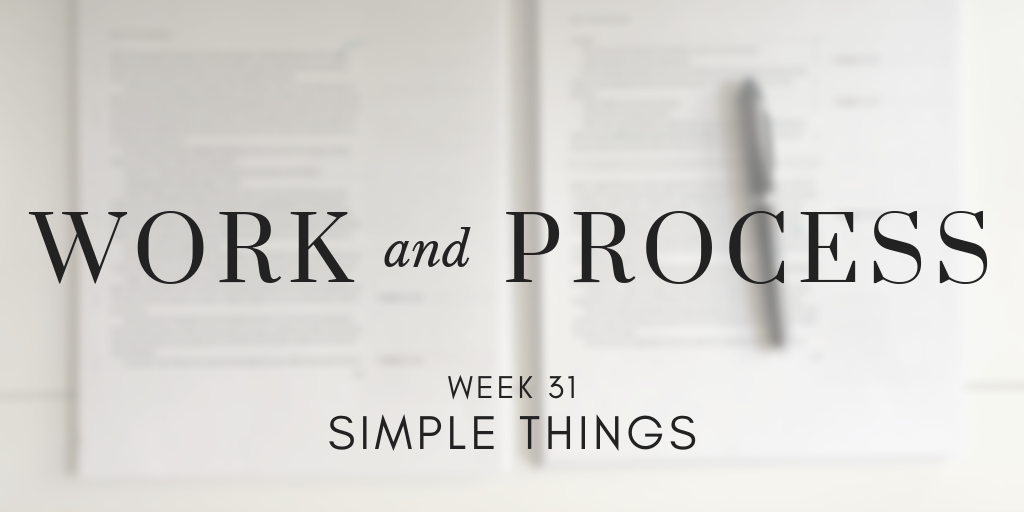|
I mentioned in Week 4 that one of my only universal pieces of writing advice is always keep learning, which is also, I suppose, a goal I try to live up to. I’m always in search of new ways to approach a story or better ways to plot or develop character. I’ve realized, however, that I don’t end up reading a lot of books on craft. The Writers Journey by Christopher Vogler and Writing 21st Century Fiction by Donald Maas, for example, are the only ones I return to again and again, and the only ones I always recommend. I think this is because I tend to find long, complicated writing tools difficult to actually use. Take character sheets, for example, where you answer dozens of questions about your character. These questions can be helpful and some writers swear by them, but for me, having so many of them to answer completely stymies my creative process. I get so hung up on feeling like I have to have every answer--How tall is this character? What’s their astrological sign/MBTI type? What do they eat for breakfast?--that I just stop writing entirely. Or, for plotting, take beat sheets, where the main points or “beats” of a story are broken down not only by how they function in the narrative but also by what page number you should be at when you hit them. A lot of people use beat sheets religiously, but I’ve tried them and ultimately just find them constricting and overwhelming.
For me, it’s the simple things that work best for my own writing practice. This is why I like that 10 Things exercise from Week 11, or Writing 21st Century Fiction, which is organized by craft issue (like “The Inner Journey,” “The Outer Journey,” and “Standout Characters”) and has a bunch of exercises at the end of each chapter, so you can just flip to the issue you’re working on and pick one or two prompts that work for you. With twelve steps, the Hero’s Journey might be the most complicated tool I regularly use, but after years of studying it in books and other media, it’s almost become second-nature to me, particularly in terms of energy and tension, rather than plot points. More often, however, I use Dan Wells’ Seven-Point Plot Structure (only seven points! for a whole story!). My friend Jessica Cluess, author of the Kingdom on Fire trilogy and the forthcoming House of Dragons, uses a technique called “fortunately/unfortunately” to get the action moving. I took a workshop called “Plot Like a Film” with Tiffany Jackson (author of Allegedly and Monday’s Not Coming) at the Highlights Foundation Summer Camp, and, after later going to her office hours, found that I can think of plot points in terms of how “strong” they are. Can they hold the weight of the rest of the story? If not, they’re not strong enough! Simple. And easy to use. These are the kinds of tools I most often incorporate into my creative process. At the Highlights Foundation last month, I spoke to another writer about world-building, and she expressed some anxiety over the fact that she didn’t have a “bible” (a long, thorough, well-organized compendium of a fantasy world’s geography, history, culture, etc.). I told her I've never used one, and, while I think it could be helpful for keeping things straight and referencing later if you’re writing a long series, I have almost zero desire to make one. ¯\_(ツ)_/¯ Big, complex tools like this work for some people. They do not work for me. And while I occasionally struggle with I should do this or I should do that, mostly I’ve come to a place where I adopt the tricks and tools that are helpful to me… and leave the ones that don’t. Perhaps this all goes back to my dislike for prescriptive writing advice. Feeling like we have to write a certain way, or we have to use a certain tool, or we have to have an artistic process that conforms to somebody else’s vision of what creativity looks like… well, that’s so much pressure to take on things that may or may not actually be helpful. I think my feelings ultimately boil down to this: If simple works for you, great. If you prefer complex, also great. If you do some combination of the two, great. Use the tools that make you a better, more thoughtful writer, or a more efficient one, or open up the ways you can think about storytelling, or or or… Feel free to leave everything else. Comments are closed.
|
ARCHIVES
February 2024
CATEGORIES |


 RSS Feed
RSS Feed